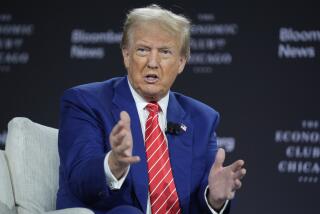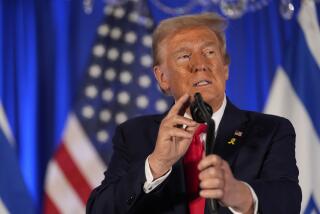Tensions erupt between Trump and the CIA over Russia’s hacking during the 2016 campaign
President-elect Donald Trump attends the 117th Army-Navy football game with former New York City Mayor Rudy Giuliani in Baltimore on Dec. 10, 2016.
Tensions between Donald Trump and U.S. intelligence officials boiled over Saturday as Trump’s transition team mockingly compared a secret CIA assessment that Russia tried to sway the U.S. election in Trump’s favor to the agency’s historic misjudgments on Iraq’s weapons of mass destruction.
The widening public rift between the incoming president and the nation’s powerful intelligence community could pose high-risk problems both for his administration and for national security.
CIA leaders at agency headquarters in Langley, Va., are bracing for a potentially adversarial relationship with Trump’s White House, especially over what the spy agency sees as Russia’s malign role on multiple fronts, according to two officials who requested anonymity in speaking about internal discussions.
“It sets up one of the great crises in the history of the executive branch,” said Glenn Carle, a former senior CIA officer who spent more than two decades as a spy before retiring in 2007. “All the agency can do short of insurrection is to present the facts when allowed to the executive we serve.”
Trump has received only a handful of classified intelligence briefings since his upset victory last month, and CIA officials now believe it is because Trump has rejected their assessments on Moscow’s aggression in Ukraine, its pressure on Eastern Europe and its computer hacks to boost Trump’s chances against Hillary Clinton.
Some compared the current tensions to the distrust that marked relations with Vice President Dick Cheney before the 2003 U.S.-led invasion of Iraq, when he was widely seen as cherry-picking raw intelligence and pushing agency analysts to support his views.
President Nixon had a famously frosty relationship with the CIA, which he considered too powerful and too independent. President Clinton’s first CIA director, R. James Woolsey, was so disliked in the White House that he could barely get an appointment to see the president.
Still, no other incoming president has publicly rejected a major CIA assessment about a security threat, or declined regular classified briefings from officials representing America’s $70-billion-a-year global espionage and surveillance apparatus.
Nor has a transition team issued a statement like the one it emailed Saturday after the Washington Post reported that the CIA had concluded that Russian President Vladimir Putin’s government had authorized the hacking and leaking of Democratic Party emails this year in a deliberate effort to damage Hillary Clinton and boost Trump’s chances.
“These are the same people that said Saddam Hussein had weapons of mass destruction,” the statement said, referring to the misjudgments and mistakes used to justify the invasion of Iraq, a systemic intelligence failure that badly tarnished the CIA’s reputation.
These are the same people that said Saddam Hussein had weapons of mass destruction.
— Trump transition team on reports of Russian interference to help them win the 2016 election
The Trump team’s statement went on to say that the Nov. 8 election “ended a long time ago in one of the biggest electoral college victories in history,” a claim that is untrue.
Eight of the 12 most recent presidential elections have been decided with a larger electoral college victory. And unlike most elections, Trump lost the popular vote.
Inside the CIA, career analysts have been mystified by Trump’s repeated dismissal of evidence that Russia hacked into Democratic National Committee emails and copied communications from Hillary Clinton’s campaign chairman, John Podesta.
There are also growing concerns about Trump’s pick for national security advisor, retired three-star Army Gen. Michael Flynn, whom the Obama administration fired as head of the Defense Intelligence Agency.
Flynn’s tenure there was rocky, in part because he ordered aides to chase pet theories that quickly became known as “Flynn facts,” since they were not grounded in reality.
Trump’s choice to run the CIA, Rep. Mike Pompeo (R-Kan.), an aerospace entrepreneur and former Army officer, could get caught in the middle.
Pompeo developed a rapport with CIA leaders as a member of the House Intelligence Committee panel that oversees the agency. Pompeo, who graduated first in his class at West Point, has a reputation as a quick study and an advocate for the CIA.
Now he will take over an agency that has been openly criticized by his future boss, the president-elect.
“He’s going to be in an awkward spot when he is called to give a lay-down on Russia or some other topic,” a former senior national security official who has advised Trump’s transition team said in an interview.
CIA analysts will expect Pompeo to relay their unvarnished view but Trump may not want to hear it, the former official said, speaking on condition of anonymity.
Trump has repeatedly said that he doesn’t believe that Russia tried to interfere in the election, has praised Putin and has called for closer relations with the Kremlin.
“I don’t believe they interfered,” Trump said in an interview with Time magazine published this week. The hacking, he said, “could be Russia. It could be China. And it could be some guy in New Jersey.”
U.S. agencies believe they have identified who in the Russian government was involved in ordering operations to disrupt the U.S. election and how they were orchestrated. They are reluctant to make the information public because that could compromise how the intelligence was gathered, a U.S. official said, speaking on condition of anonymity.
The FBI is still investigating the Russian hacks and have yet to find that a U.S. citizen assisted them, the official said.
Rep. Adam B. Schiff (D-Burbank), the top Democrat on the House Intelligence Committee, said Trump is not disregarding the intelligence because he has examined the information and disagrees with how it was interpreted. Rather, he said, Trump has rejected it because “it doesn’t fit with the political narrative he wants to tell.”
That doesn’t bode well for how Trump will act as president. “He is willing to disparage the intelligence community when it benefits him,” Schiff said.
On Friday, the White House said that President Obama had ordered the CIA and other intelligence agencies to conduct a full review of foreign-based digital attacks aimed at influencing the election.
Obama ordered the review completed before he leaves office on Jan. 20, in what appeared to be an attempt to ensure the incoming administration doesn’t kill the inquiry.
Twitter: @ByBrianBennett
More to Read
Sign up for Essential California
The most important California stories and recommendations in your inbox every morning.
You may occasionally receive promotional content from the Los Angeles Times.











